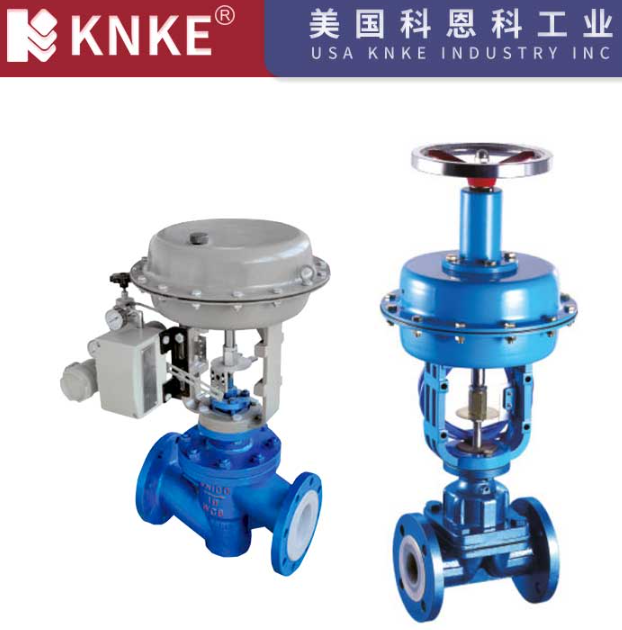Types and Corrosion Resistance of Fluorine-lined Valves
Fluorine-lined valves are widely used in industries such as chemicals, petrochemicals, pharmaceuticals, and food processing, especially in environments where superior corrosion resistance is required. Due to their unique ability to resist corrosion, fluorine-lined valves perform excellently in the presence of strong acids, alkalis, oxidizers, and other corrosive substances. This article will explore the different types of fluorine-lined valves and their corrosion resistance capabilities.

1. Types of Fluorine-lined Valves
Fluorine-lined valves are available in various types, each suited to different functions and operating environments. Here are some common types of fluorine-lined valves:
- Fluorine-lined Gate Valve: Primarily used for on/off control in pipelines, suitable for environments that require strict sealing and corrosion resistance.
- Fluorine-lined Globe Valve: Used for precise flow control, ideal for handling various corrosive media.
- Fluorine-lined Butterfly Valve: Used to regulate flow by rotating a disc, widely applied in chemical industries for corrosive substances.
- Fluorine-lined Check Valve: Prevents backflow of media, ensuring the safety of the pipeline system.
- Fluorine-lined Safety Valve: Automatically opens to release excess pressure when the internal pressure of the pipeline exceeds a preset value, preventing pipeline rupture.
- Fluorine-lined Diaphragm Valve: Used in handling corrosive fluids or fluids with solid particles, offering excellent sealing performance.
- Fluorine-lined Blow-off Valve: Used for the discharge of liquids or gases, common in the chemical and pharmaceutical industries.
- Fluorine-lined Ball Valve: Used for opening and closing the fluid passage, suitable for precise flow control in corrosive environments.
- Fluorine-lined Filter: Used to filter impurities from fluids, ensuring the normal operation of the system.
- Fluorine-lined Plug Valve: Used for precise flow control, ideal for highly corrosive environments.
- Fluorine-lined Hose, Fluorine-lined Elbow, Fluorine-lined Straight Pipe, Fluorine-lined Pipe Fittings: These fluorine-lined accessories are used in pipeline systems to effectively prevent corrosion of the pipes.
The fluorine lining on these valves and accessories provides excellent protection in highly corrosive environments, significantly extending the equipment’s service life and reliability.
2. Corrosion Resistance of Fluorine-lined Valves
The corrosion resistance of fluorine-lined valves is primarily due to the PTFE (polytetrafluoroethylene) lining. PTFE offers exceptional chemical stability and corrosion resistance, making it ideal for handling aggressive substances such as concentrated sulfuric acid, hydrochloric acid, hydrofluoric acid, aqua regia, strong oxidizers, organic acids, and other corrosive media. Below are the specific corrosion resistance features of fluorine-lined valves:
- Outstanding Corrosion Resistance: PTFE is highly resistant to nearly all acids, bases, salts, and organic solvents. It can withstand aggressive chemicals such as sulfuric acid, hydrochloric acid, hydrofluoric acid, aqua regia, strong oxidizers, organic acids, and many other corrosive substances without degradation.
- Wide Application Range: Fluorine-lined valves can be used in a wide range of temperatures, typically from -50°C to 170°C, making them suitable for most industrial environments.
- Reduced Friction and Improved Sealing: PTFE has an extremely low coefficient of friction, meaning fluorine-lined valves require less torque to open or close, reducing wear and improving sealing performance. This extends the service life of the valves.
- Anti-fouling and Non-stick Properties: PTFE surfaces are highly non-stick, preventing the buildup of contaminants. This self-cleaning ability ensures that the valve operates efficiently over time, even in the presence of sticky or abrasive fluids.
- Suitability for Extreme Conditions: In addition to chemical resistance, fluorine-lined valves can also withstand high pressure and temperature conditions, making them suitable for demanding environments in industries such as petrochemicals, coal chemicals, and more.
- Widely Used in Food and Pharmaceutical Industries: Due to its non-toxic, non-polluting, and easy-to-clean properties, fluorine-lined valves are commonly used in the food and pharmaceutical industries, ensuring that fluids are transported without contamination and maintaining product safety and hygiene.
3. Considerations for Using Fluorine-lined Valves
Although fluorine-lined valves offer exceptional corrosion resistance, there are still some important considerations when using them:
- Temperature Limitations: Fluorine-lined valves are typically suitable for media with temperatures ranging from -50°C to 170°C. Exceeding this temperature range may cause changes in the physical properties of PTFE, which could affect the valve’s performance.
- Pressure Limitations: When used in high-pressure conditions, it is essential to choose the appropriate valve type and size to ensure that the valve can handle the system’s pressure.
- Maintenance and Cleaning: While PTFE has excellent self-cleaning properties, regular inspection and cleaning of the valve’s internal and external surfaces can further extend its service life and ensure reliable performance.
Fluorine-lined valves have become indispensable in many industries due to their superior corrosion resistance and versatile application. With various types available, they can meet different operational needs, while the PTFE lining provides outstanding protection against a wide range of corrosive media. When selecting a fluorine-lined valve, it is important to consider factors such as the type of fluid, temperature, and pressure to ensure optimal performance and longevity of the valve in corrosive environments.
